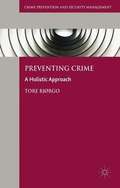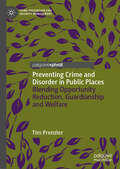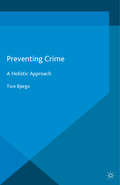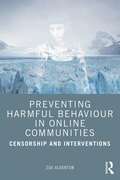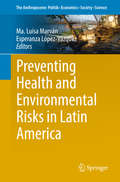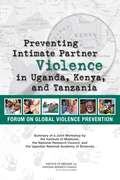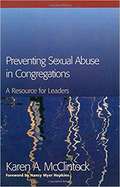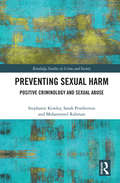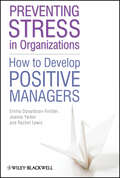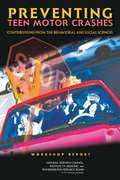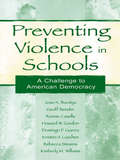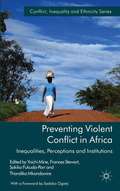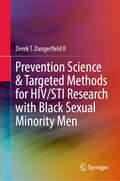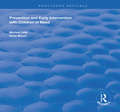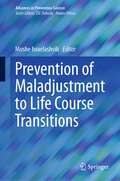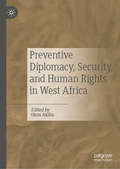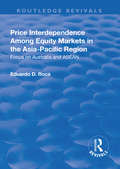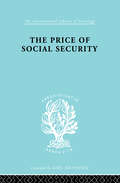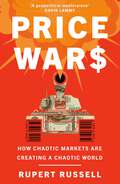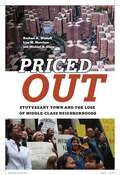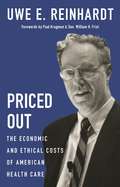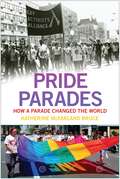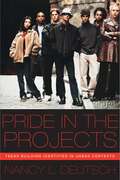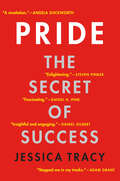- Table View
- List View
Preventing Crime and Disorder in Public Places: Blending Opportunity Reduction, Guardianship and Welfare (Crime Prevention and Security Management)
by Tim PrenzlerThis accessible, short book provides scientifically informed guidance on effective wholistic place management strategies for preventing crime. It integrates theoretical perspectives and practical examples of crime prevention methods that can be readily implemented by responsible stakeholders. It covers locations including town centers, shopping malls, parks, beaches, transit hubs, campuses, stadiums and entertainment precincts, where security programs sometimes attract criticism regarding the exclusion or persecution of marginalized groups. This book advocates for overlapping forms of crime prevention and social support that address the need to make large improvements in safety in public places while supporting marginalized and vulnerable groups. Readers are exposed to a wide range of successful case studies as well as the central role of a systematic problem-solving methodology. It speaks to crime prevention and social services professionals, academics, and students, as well as interested members of the public.
Preventing Crime: A Holistic Approach (Crime Prevention and Security Management)
by Tore BjørgoTraditional "schools" of crime prevention, like the criminal justice model, social crime prevention or situational crime prevention, have proved to be too narrow and do not combine well with other approaches. However, each of these models provides important insights and contributions for reducing crime. By extracting the main preventive mechanisms of these diverse approaches, this book develops a more holistic, general model that consists of nine preventive mechanisms: building normative barriers to crime, reducing recruitment, deterrence, disruption, incapacitation, protecting vulnerable targets, reducing benefits of crime, reducing harm, and facilitating desistance. The measures to activate the preventive mechanisms may differ according to the type of crime, as may the actors in charge of implementing the relevant measures. However, Tore Bjørgo demonstrates how his model of crime prevention can be effectively applied to diverse forms of crime, from domestic burglaries to criminal youth gangs and driving under the influence to organized crime and terrorism. In doing so, this important book will be of interest to scholars and students of policing, security studies and criminology, as well as practitioners and policy-makers.
Preventing Harmful Behaviour in Online Communities: Censorship and Interventions
by Zoe AldertonPreventing Harmful Behaviour in Online Communities explores the ethics and logistics of censoring problematic communications online that might encourage a person to engage in harmful behaviour. Using an approach based on theories of digital rhetoric and close primary source analysis, Zoe Alderton draws on group dynamics research in relation to the way in which some online communities foster negative and destructive ideas, encouraging community members to engage in practices including self-harm, disordered eating, and suicide. This book offers insight into the dangerous gap between the clinical community and caregivers versus the pro-anorexia and pro-self-harm communities – allowing caregivers or medical professionals to understand hidden online communities young people in their care may be part of. It delves into the often-unanticipated needs of those who band together to resist the healthcare community, suggesting practical ways to address their concerns and encourage healing. Chapters investigate the alarming ease with which ideas of self-harm can infect people through personal contact, community unease, or even fiction and song and the potential of the internet to transmit self-harmful ideas across countries and even periods of time. The book also outlines the real nature of harm-based communities online, examining both their appeal and dangers, while also examining self-censorship and intervention methods for dealing with harmful content online. Rather than pointing to punishment or censorship as best practice, the book offers constructive guidelines that outline a more holistic approach based on the validity of expressing negative mood and the creation of safe peer support networks, making it ideal reading for professionals protecting vulnerable people, as well as students and academics in psychology, mental health, and social care.
Preventing Health and Environmental Risks in Latin America
by Ma. Luisa Marván Esperanza López-VázquezThis book addresses environmental and medical issues that could risk our well-being, our health, or even cause death. Some of the issues analysed could have negative consequences not only today but also for future generations if not prevented in time. With regard to health risks, the authors discuss several diseases that could be avoided if people perform (or avoid) certain behaviours and become accustomed to having healthier habits. Concerning environmental hazards, the authors discuss which social groups should be taken into account based on preventive strategies used to avoid a particular disaster. Both sections of the book on health and environmental issues have a subsection with chapters about risks and society. No matter the risk-related discipline the reader is familiar with, when he ends reading the book, it will become clear that risk analysis is the basis for prevention, and that it cannot be addressed from a single discipline nor with a single methodology.
Preventing Intimate Partner Violence in Uganda, Kenya, and Tanzania: Summary of a Joint Workshop by the Institute of Medicine, the National Research Council, and the Uganda National Academy of Sciences
by Louise FlavahanGlobally, between 15-71 percent of women will experience physical and/or sexual abuse from an intimate partner at some point in their lifetime. <P><P>Too often this preventable form of violence is repetitive in nature, occurring at multiple points across the lifespan. The prevalence of intimate partner violence is on the higher end of this spectrum in East Africa, with in-country demographic and health surveys indicating that approximately half of all women between the ages of 15-49 in Uganda, Kenya, and Tanzania having experienced physical or sexual abuse within a partnership. It is now widely accepted that preventing intimate partner violence is possible and can be achieved through a greater understanding of the problem; its risk and protective factors; and effective evidence-informed primary, secondary, and tertiary prevention. To that end, on August 11-12, 2014, the Institute of Medicine's Forum on Global Violence Prevention, in a collaborative partnership with the Uganda National Academy of Sciences, convened a workshop focused on informing and creating synergies within a diverse community of researchers, health workers, and decision makers committed to promoting intimate partner violence-prevention efforts that are innovative, evidence-based, and crosscutting. This workshop brought together a variety of stakeholders and community workers from Uganda, Kenya, and Tanzania to engage in a meaningful, multidirectional dialogue regarding intimate partner violence in the region. "Preventing Intimate Partner Violence in Uganda, Kenya, and Tanzania" summarizes the presentations and discussion of the workshop.
Preventing Sexual Abuse in Congregations: A Resource for Leaders
by Karen McClintockAre you ready to abuse-proof your congregation? If one child or adult is spared the confusing ordeal of unwanted touch, it will be worth your time to read this book. In this comprehensive resource, Methodist pastor and pastoral psychologist Karen McClintock demonstrates that sexual abuse in congregations is preventable and gives clergy and lay leaders the tools they need to prevent it. This book shows congregations how to protect children and vulnerable adults, prevent sexual harassment either by clergy or of clergy, and strengthen clergy families by raising awareness of the occupational and emotional risks inherent in pastoral ministry. When you have finished this book, you will be familiar with the conditions in parishes and in the mental health of the individuals within them that lead to risky behaviors. You will be equipped to recognize and set sexual boundaries for yourself and to open dialogue about these issues in your congregation. You will have laughed at, celebrated, and honored human sexual power, pleasure, and vulnerability. You will have gained the knowledge you need, and perhaps the courage, to communicate these ideas within your congregation so that children and vulnerable adults are protected.
Preventing Sexual Harm: Positive Criminology and Sexual Abuse (Routledge Studies in Crime and Society)
by Mohammed Rahman Stephanie Kewley Sarah PembertonPreventing Sexual Harm provides an overview of current criminal justice strategies to tackling sexual violence, and highlights existing positive criminological approaches that could help prevent sexual abuse and harm. Sexual violence is a complex, multi-faceted crime. Its causes and consequences are both multiple and enduring and our understanding of sexual violence is embedded within our social, cultural and political constructs. As such, a response to sexual violence ought to be equally as complex and multi-faceted. Alternative approaches might therefore be needed, such as Positive Criminology. In response, this book explores Positive Criminology as a mechanism to reduce the risk of recidivism, eradicate harm, prevent re-offending as well as helping to reintegrate those with histories of sexual abuse back into the community. In light of recent historical cases of sexual abuse and poor institutional response to these allegations, it opens with an overview of the current landscape of sexual offending. The book then reviews the current positive criminological approaches already in existence in the effort to prevent sexual abuse, outlining the approach of Positive Criminology and demonstrating the many gaps in practice that might benefit from this new way of working to prevent sexual abuse. Highlighting that an alternative response to sexual violence is needed, and presenting the idea that a positive criminological paradigm is worthy of further examination, this book will be of great interest to scholars of criminology, criminal justice and forensic psychology.
Preventing Stress in Organizations
by Rachel Lewis Emma Donaldson-Feilder Joanna YarkerPreventing Stress in Organizations:How to Develop Positive Managersoffers an innovative, evidence-based approach to help managers prevent and reduce workplace stress in their staff.Winner of the 2013 BPS Book Award - Practitioner Text categoryProvides information on the critical skills managers must develop in order to prevent stress in their staff, and the key ongoing behaviours that promote a healthy work environmentShows practitioners in occupational psychology, HR, Health and Safety and related professions how positive management can be integrated into an organizationâ TMs existing practices and processesServes as an essential guide for managers themselves on how to incorporate proven stress management skills into their everyday interactions with team membersBalances rigorous research grounding with real-world vignettes, case studies and exercises
Preventing Teen Motor Crashes: Contributions From The Behavioral And Social Sciences
by Institute of Medicine National Research Council Transportation Research Board of the National AcademiesFrom a public health perspective, motor vehicle crashes are among the most serious problems facing teenagers. Even after more than six months of being licensed to drive alone, teens are two to three times more likely to be in a fatal crash than are the more experienced drivers. Crash rates are significantly higher for male drivers, and young people in the United States are at greater risk of dying or being injured in an automobile than their peers around the world. In fact, in 2003 motor vehicle crashes was the leading cause of death for youth ages 16-20 in the United States. Understanding how and why teen motor vehicle crashes happen is key to developing countermeasures to reduce their number. Applying this understanding to the development of prevention strategies holds significant promise for improving safety but many of these efforts are thwarted by a lack of evidence as to which prevention strategies are most effective. Preventing Teen Motor Crashes presents data from a multidisciplinary group that shared information on emerging technology for studying, monitoring, and controlling driving behavior. The book provides an overview of the factual information that was presented, as well as the insights that emerged about the role researchers can play in reducing and preventing teen motor crashes.
Preventing Violence in Schools: A Challenge To American Democracy
by Joan N. Burstyn Geoff Bender Ronnie Casella Howard W. Gordon Domingo P. GuerraSchool violence is a burning issue these days. This book provides an in-depth analysis of violence prevention programs and an assessment of their effectiveness, using data from observations, individual interviews, and focus groups, as well as published data from the schools. It is distinguished by its focus on the cultural and structural context of school violence and violence prevention efforts. Where most other researchers use quantitative measures, such as surveys, to assess the effectiveness of violence prevention programs, the authors of this book use qualitative research and ethnography to study the environment where such programs take place. Thus, this work--one of only a few ethnographic studies of violence prevention programs in schools--links previous quantitative research on the topic and critical ethnography. Preventing Violence in Schools: A Challenge to American Democracy: *includes voices of school students, accused of practicing violence, who have been participants in violence prevention programs; *analyzes a citywide peer mediation program (who benefits and who does not, who is mediated and who mediates, and what the implications of these findings may be); *examines the kinds of violence recognized in schools and the ways schools themselves may perpetuate violence; and *describes a violence prevention program for students at an alternative school. Preventing Violence in Schools: A Challenge to American Democracy is highly relevant for students in courses on urban education, foundations of education, education and social policy, youth and the law, and qualitative research, and for teachers, administrators, and other professionals, such as school psychologists and guidance counselors, at the middle and high school levels.
Preventing Violent Conflict in Africa
by Yoichi MineHorizontal inequalities are root causes of violent conflict in Africa. Yet, people take actions not because of statistical data on inequalities, of which they might not be aware, but because of injustices they perceive. This volume analyses the results of original surveys with over 3,000 respondents in African cities and towns, exposing clear discrepancies between objective inequalities and people's subjective perceptions. The contributors examine experiences in country pairs and probe into the reasons why neighbouring countries, sharing common historical traits, sometimes took contrasting pathways of peace and violent conflict. Combining quantitative analysis and qualitative anatomy of historical experiences of conflict and reconciliation in Rwanda, Burundi, Ghana, C#65533;te d'Ivoire, South Africa, Zimbabwe, Uganda, Tanzania, Kenya and Nigeria, the study brings forward a set of policy recommendations for development practitioners. This work further addresses the issue of institutional choice and reveals how sustainable power-sharing and decentralisation contribute to political stability in Africa.
Preventing Violent Radicalisation in Europe: Multidisciplinary Perspectives
by Patrizia MeringoloThis book brings together the latest literature and European experiences on preventing youth violent radicalisation and violent actions in intergroup relations. Youth violent radicalisation is a significant problem within the European context, and requires an exploration of how various social actors can play an active role in preventing radicalisation in minors and young adults. This complex issue needs to be explored through a multidisciplinary approach, and effective operational models are needed in order to tackle it. This book describes the theoretical framework for such an approach in all its facets. The book’s originality lies in its psychosocial and participatory approach, aimed at improving results through professional training and community empowerment for building trusting relationships and educational activities. It also proposes “alternative narratives”, which are a way of representing people and groups within a social context, thereby overcoming stereotyped visions and stigma. This book focuses on participation and communication among stakeholders, social inclusion, strengthening democratic values, and pursuing a proactive instead of a reactive approach to preventing radicalisation. Highly topical, the book will appeal to researchers and students of the social and behavioural sciences interested in youth radicalisation, including social work and social policy, as well as practitioners working within the juvenile justice system.
Prevention Science & Targeted Methods for HIV/STI Research with Black Sexual Minority Men
by Derek T. Dangerfield IIDespite substantial advances in HIV/STI treatment and prevention for general population health, sexual health disparities persist for Black gay, bisexual, and other Black sexual minority men (SMM). Strategies to build trust and overcome barriers are not well-established and solutions remain elusive. The contemporary prevention science landscape also requires updated perspectives in light of changing social policies, technological advancements, and prevention options. This book is the first to provide a comprehensive overview for sexual health prevention science using years of significant research from Dangerfield II et al. involving U.S. Black SMM in light of existing studies. This book identifies knowledge and practice gaps and proposes recommendations for innovative methods for academic collaboration with communities of practice. Researchers, clinicians, and public health practitioners will be guided through the sexual health research and intervention process using targeted contemporary studies to enhance their practice. This book serves as a valuable resource for enhancing the skills of emerging prevention scientists and clinicians. It also offers innovative strategies for experienced prevention experts to refine techniques and address persistent health disparities in sexual health outcomes. The book targets audiences across disciplines, including public health, sociology, psychology, nursing, medicine, anthropology, and population science and can be applied to marginalized communities globally. By bridging research, practice, and innovation, this book serves as a transformative resource for addressing sexual health disparities and empowering collaborative solutions to advance equity in the U.S. and around the globe.
Prevention and Early Intervention with Children in Need (Routledge Revivals)
by Michael Little Kevin MountFirst published in 1999, this volume examines how, in the middle of the nineteenth century, Dr John Snow is reputed to have wrenched the handle from a street pump in central London, forcing people in the neighbourhood to change their drinking habits and so preventing them from contracting cholera from the dirty water. Aspects of the story may be apocryphal, but the general drift of Snow's assault on disease has enormous appeal for health, education, social services and police professionals working with children in need. Why spend so much time struggling to find strategies to cope with the more intractable problems among adolescents, when the problems might be prevented from occurring in the first place? This book tries to untangle some of the complex ideas that underpin effective prevention and early intervention activity on behalf of children experiencing social or psychological difficulty. It describes twenty programmes from Europe and America that have made an impact and where there has been an attempt to evaluate their usefulness. On this basis it suggests some principles for more effective preventive practice.
Prevention of Maladjustment to Life Course Transitions (Advances in Prevention Science)
by Moshe IsraelashviliThis book provides a comprehensive and updated review of the concepts, models, and interventions related to the process of adjustment to life course transitions. In times of transition, an individual is exposed to experiences that require them to assume new roles and exhibit updated behaviors. Regardless of the characteristics of these transitions, exposure to normative trajectories imposes on the person an intensive engagement in a process of (re-)adjustment. Sometimes this demand is beyond the scope of one's ability, motivation, or comprehension. Hence, some people might ineffectively perceive and/or react to the change and end up feeling unable to handle the change and inclined to escape the situation. A preventive intervention that either reduces the impact of possible risk factors or fosters possible protective factors would support the people in managing the transition. While the importance of prevention of maladjustment is repeatedly mentioned in the literature, this is the first-known book on how to prevent maladjustment. It examines how the sense of transition emerges, what adjustment means, the models that elaborate on how people manage in times of transition, what the antecedents of maladjustment are, and especially how maladjustment could be prevented. Out of these discussions, a new model, The Transitional Stress and Adjustment (TSA) Model, is suggested as a grand framework for paving a way forward to better prevent people's maladjustment to life course transitions. Prevention of Maladjustment to Life Course Transitions is a much-needed cornerstone in the future development within the prevention science framework. This book has interdisciplinary appeal for researchers, practitioners, and graduate students in psychology, sociology, public health, social work, criminology, medicine, health sciences, public policy, economics, and education who consider prevention an important vehicle of intervention to promote health and wellbeing. Its focus on the topic of adjustment also would be of special interest to those who explore child and youth development.
Preventive Diplomacy, Security, and Human Rights in West Africa
by Okon AkibaThis edited volume focuses on the development and conflict prevention mechanism of the Economic Community of West African States, ECOWAS. The contributors discuss complex socio-political and economic issues and use a cross disciplinary approach to treat most of the dominant research questions in the field. The chapters come nicely together in a kaleidoscope of knowledge deriving from scholarly investigative traditions in political science, anthropology, economics, law, and sociology. The book is conceived as a source of reference and for graduate courses in African politics, development, human rights, transnational law, and international public policy.
Price Interdependence Among Equity Markets in the Asia-Pacific Region: Focus on Australia and ASEAN
by Eduardo RocaThis title was first published in 2000: An investigation of the issue of financial markets interdependence or integration through the application of recently developed and powerful techniques in time series econometrics. The text provides coverage of theoretical analysis and applications in the context of the Asia-Pacific region.
Price Socl Security Ils 187 (International Library of Sociology)
by G. WilliamsFirst Published in 1998. Routledge is an imprint of Taylor & Francis, an informa company.
Price Wars: How Chaotic Markets Are Creating a Chaotic World
by Rupert RussellFor Rupert Russell, the shock of the Trump-Brexit victories was only the latest in a decade full of them: the unstoppable war in Syria, huge migrant flows into Europe, beheadings in Iraq, children caged at the US border. In Price Wars he sets out on an improbable journey to investigate what caused the wave of chaos that consumed the world in the 2010s.Armed with a notebook, flak jacket and pink socks, Russell travels to modern apocalypses across five continents, embedding with separatist soldiers in the trenches of Eastern Ukraine, gangs of street kids battling over garbage in Caracas, the UN bomb disposal squad in Iraq and cattle raiders in Northern Kenya. He traces the origins of these conflicts back to dramatic and mysterious swings in the prices of essential commodities. He meets with commodity speculators who describe the inner workings of these volatile markets, explaining how food prices can spike even in years of abundant harvests, causing bread riots and revolutions. Oil prices can surge on rumours, enriching and emboldening dictators and terrorists alike. These price shocks, and many others across the decade, triggered local disasters that became global catastrophes. It is chaotic prices, Russell learned, fuelled by banks and hedge funds in New York and London, that have toppled regimes and fractured the West.Price Wars is a page-turning chronicle of discovery and a ground-breaking expose of the power of price to devastate the world.
Priced Out: Stuyvesant Town and the Loss of Middle-Class Neighborhoods
by Lisa M. Morrison Michael R. Glass Rachael A. WoldoffOn an average morning in the tree-lined parks, plazas, and play-areas of Manhattan’s Stuyvesant Town housing development, birds chirp as early risers dash off to work, elderly residents enjoy a peaceful morning stroll, and flocks of parents usher their children to school. It seems an unlikely location for conflict and strife, yet this eighteen-block area, initially planned as middle-class affordable housing, is the site of an ongoing struggle between long-term, rent-regulated residents, younger, market-rate tenants, and new owners seeking to turn this community into a luxury commodity. Priced Out takes readers into this heated battle as a transitioning neighborhood wrestles with contemporary capitalist strategies and the struggle to preserve renters’ rights. Since the early 2000’s, Stuyvesant Town’s owners have sought to transform this iconic Manhattan housing development into a luxury destination for those able to afford the higher price tag. Attempting to replace longtime residents with younger, more affluent tenants, they have disrupted native residents’ sense of place, community, and their perceived quality of life. Through resident interviews, the authors offer an intimate view into the lives of different groups of tenants involved in this struggle for prime real estate in New York, from students experiencing the city for the first time to baby boomers hanging on to the vestiges of middle-class urban life. A compelling, fascinating account of changing urban landscapes and the struggle for security, Priced Out offers a comprehensive perspective of a community that, to some, is becoming unrecognizable as it is upgraded and altered.
Priced Out: The Economic and Ethical Costs of American Health Care
by Uwe E. ReinhardtFrom a giant of health care policy, an engaging and enlightening account of why American health care is so expensive—and why it doesn't have to beUwe Reinhardt was a towering figure and moral conscience of health care policy in the United States and beyond. Famously bipartisan, he advised presidents and Congress on health reform and originated central features of the Affordable Care Act. In Priced Out, Reinhardt offers an engaging and enlightening account of today's U.S. health care system, explaining why it costs so much more and delivers so much less than the systems of every other advanced country, why this situation is morally indefensible, and how we might improve it.The problem, Reinhardt says, is not one of economics but of social ethics. There is no American political consensus on a fundamental question other countries settled long ago: to what extent should we be our brothers' and sisters' keepers when it comes to health care? Drawing on the best evidence, he guides readers through the chaotic, secretive, and inefficient way America finances health care, and he offers a penetrating ethical analysis of recent reform proposals. At this point, he argues, the United States appears to have three stark choices: the government can make the rich help pay for the health care of the poor, ration care by income, or control costs. Reinhardt proposes an alternative path: that by age 26 all Americans must choose either to join an insurance arrangement with community-rated premiums, or take a chance on being uninsured or relying on a health insurance market that charges premiums based on health status.An incisive look at the American health care system, Priced Out dispels the confusion, ignorance, myths, and misinformation that hinder effective reform.
Pride Parades: How a Parade Changed the World
by Katherine McFarland BruceOn June 28, 1970, two thousand gay and lesbian activists in New York, Los Angeles, and Chicago paraded down the streets of their cities in a new kind of social protest, one marked by celebration, fun, and unashamed declaration of a stigmatized identity. Forty-five years later, over six million people annually participate in 115 Pride parades across the United States. They march with church congregations and college gay-straight alliance groups, perform dance routines and marching band numbers, and gather with friends to cheer from the sidelines. With vivid imagery, and showcasing the voices of these participants, Pride Parades tells the story of Pride from its beginning in 1970 to 2010. Though often dismissed as frivolous spectacles, the author builds a convincing case for the importance of Pride parades as cultural protests at the heart of lesbian, gay, bisexual, and transgender (LGBT) community. Weaving together interviews, archival reports, quantitative data, and ethnographic observations at six diverse contemporary parades in New York City, Salt Lake City, San Diego, Burlington, Fargo, and Atlanta, Bruce describes how Pride parades are a venue for participants to challenge the everyday cultural stigma of being queer in America, all with a flair and sense of fun absent from typical protests. Unlike these political protests that aim to change government laws and policies, Pride parades are coordinated, concerted attempts to improve the standing of LGBT people in American culture.
Pride in the Projects: Teens Building Identities in Urban Contexts (Qualitative Studies in Psychology #5)
by Nancy L. DeutschTeens in America’s inner cities grow up and construct identities amidst a landscape of relationships and violence, support and discrimination, games and gangs. In such contexts, local environments such as after-school programs may help youth to mediate between social stereotypes and daily experience, or provide space for them to consider themselves as contributing members of a community.Based on four years of field work with both the adolescent members and staff of an inner-city youth organization in a large Midwestern city, Pride in the Projects examines the construction of identity as it occurs within this local context, emphasizing the relationships within which identities are formed. Drawing on research in psychology, sociology, education, and race and gender studies, the volume highlights the inadequacies in current identity development theories, expanding our understanding of the lives of urban teens and the ways in which interpersonal connections serve as powerful contexts for self-construction. The adolescents’ stories illuminate how they find ways to discover who they are, and who they would like to be — in positive and healthy ways — in the face of very real obstacles. The book closes with implications for practice, alerting scholars, educators, practitioners, and concerned citizens of the positive developmental possibilities inherent in youth settings when we pay attention to the voices of youth.
Pride: The Secret of Success
by Jessica Tracy“Jessica Tracy has flipped the script on pride, showing that it’s not just a deadly sin to be avoided, but also a vitalizing virtue to be nurtured.” —Robert Cialdini, New York Times–bestselling author of InfluenceWhy did Paul Gauguin abandon middle-class life to follow the path of a starving artist? What explains the massive success of Steve Jobs, a man with great ideas but weak programming skills and a questionable managerial style? How did Dean Karnazes—the famed “Ultramarathon Man”—transform himself from a directionless desk jockey into an extreme athlete who once ran fifty marathons in fifty days? As the renowned emotion researcher Jessica Tracy reveals, each of these superachievers has been motivated by an often maligned emotion: pride. Its dark, hubristic side is well known, but Tracy shows that pride is also essential for helping us become our best, brightest selves. It makes us strive for excellence. In the right doses and the right contexts, it has been proven to boost creativity, motivate altruism, and confer power and prestige on those who display it. In Pride, Tracy explains how we can make this double-edged emotion serve us—rather than the other way around.Previously published in hardcover as Take Pride“A revelation. A renowned psychologist, Jessica Tracy explains that seeking our best self is nothing to be ashamed of, but that seeking praise at all costs gets us into the worst kind of trouble” —Angela Duckworth, #1 New York Times–bestselling author of Grit“Fascinating . . . Tracy uses original research to show that pride is a major part of what it means to be human and can be harnessed as a force for good.” —Daniel H. Pink, New York Times–bestselling author of Drive
